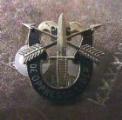I recently studied Clausewitz more closely, especially the chapters which are not very well known. Here is the chapter on "Volksbewaffnung" or "Arming the Nation". This chapter has to been seen as part of the
strategic defence integrated in his
overall concept of war. Given that the Prussian court and a great part of the establishment feared that arming the people could result in anti-royalist revolutions and Clauswitz pressed for such a strategy one should not be surprise that this influences the way he presents this topic. It didn't certainly prevent Lenin and Mao from learning.
The chapter is
here
Given the political background, now wonder he starts like that.
He continues and describes how warfare changed forever with the inclusion of the popular masses:
Then he broadens it and explains why the people's war is a special case:
Sic, keep in mind the various guerilla wars as in Spain, Napoleonic Russia, the Sovietunion in WWII, China during and after the WWII and Afghanistan. But so far it can still be still be seen in the prism of the industrial wars (WWI, WWII) to come. But as it is part of the book on defense, it increasingly focuses on the effects of the resistance of the agitated people against an invader.
A very important part comes than:
To which the politcal context - fear of popular revolution, similar the French one - influenced the last sentence is unknown. (As said before, CvC's idea of an militia was considered dangerous by Prussia's ruling class.) It is a very interesting statement and especially interesting when used to analyse the situation in Afghanistan. To which extent the safe tribal areas in Pakistan and the flow of ressources and money substitute the "regular army" is quite a question. Note also that Allies play a very important part in the strategic defense according to other Chapters.
Interestingly Mao warned the guerilla leaders in Latinamerica to accept his specific strategy, which relied to a great deal on the huge and difficult terrain of China and the support of the large rural majority as dogma.
While he limits the power of the unsupported "guerilla war" he then up with this.
Very hard not to think about Afghanistan, or China in WWII, isn't it?
... or Afghanistan
What follows shows that the writer has experienced and studied guerilla war very carefully.
Surly on of the most interesting descriptions written on the topic. Take away "National Levies and armed peasantry" and use "Insurgency" and it becomes rather "modern".
I will continue later to comment it.







 Reply With Quote
Reply With Quote
Bookmarks